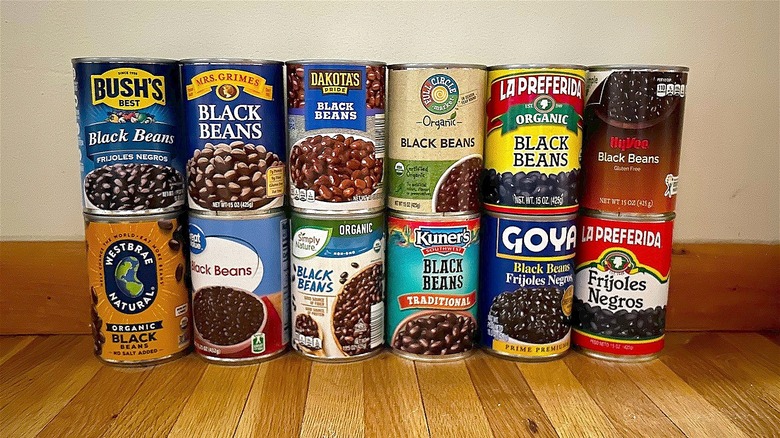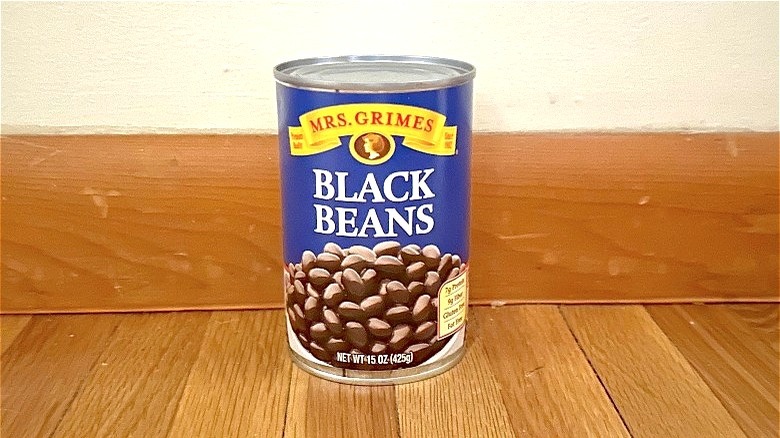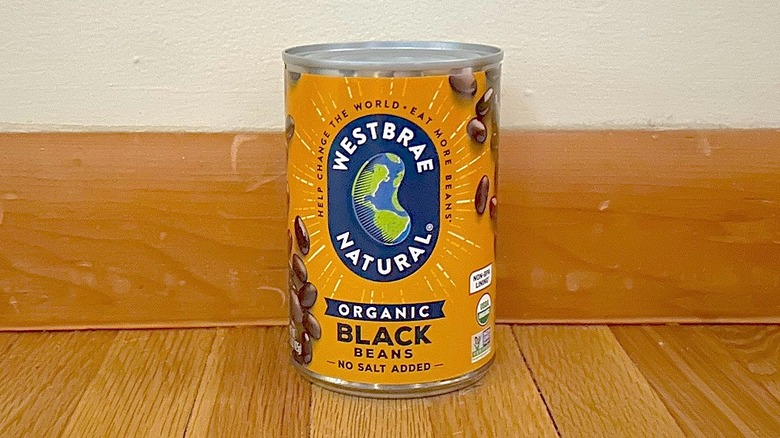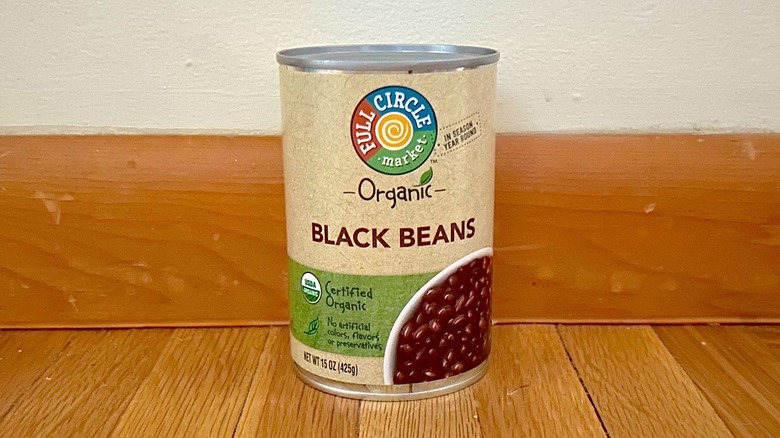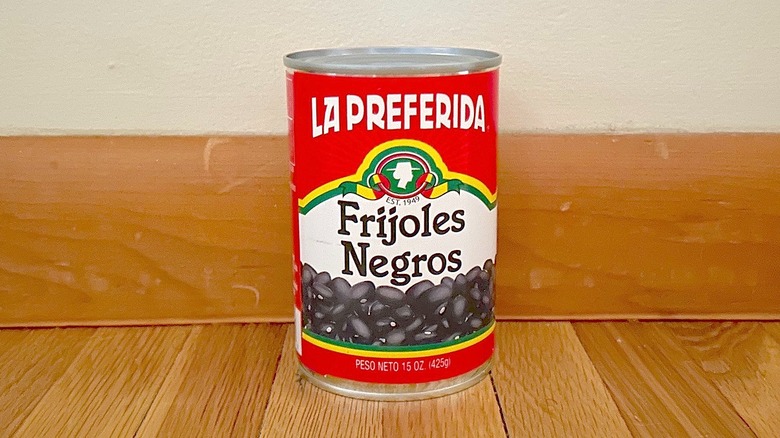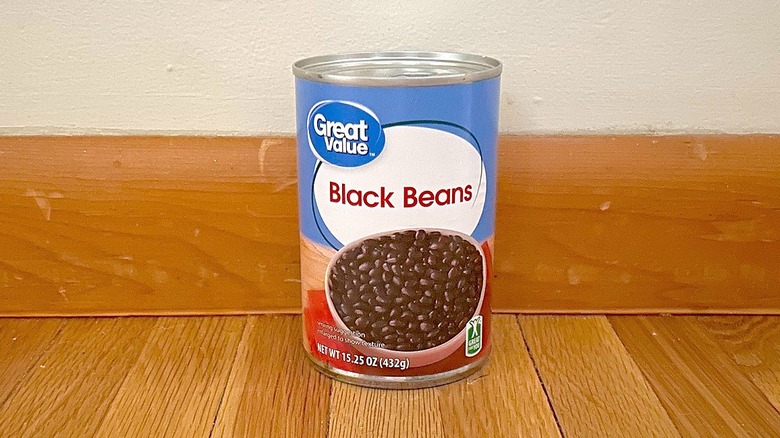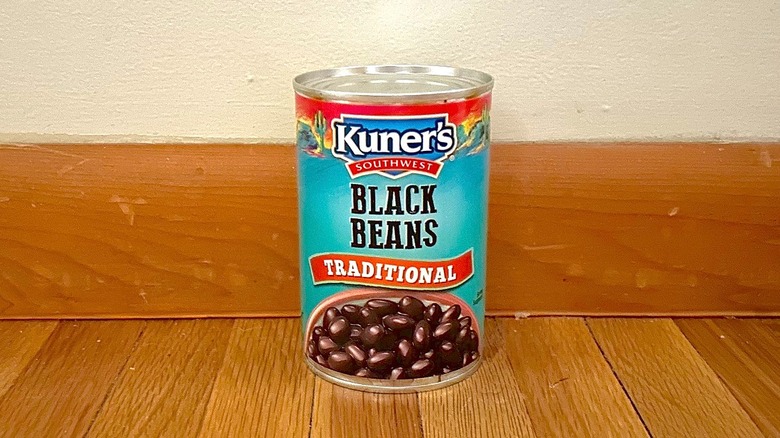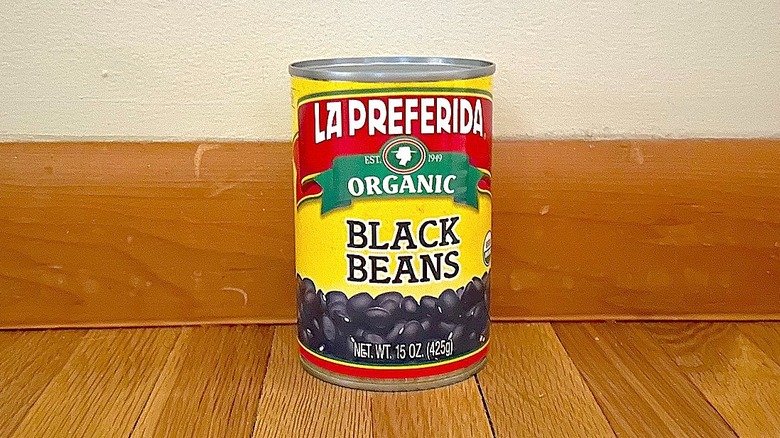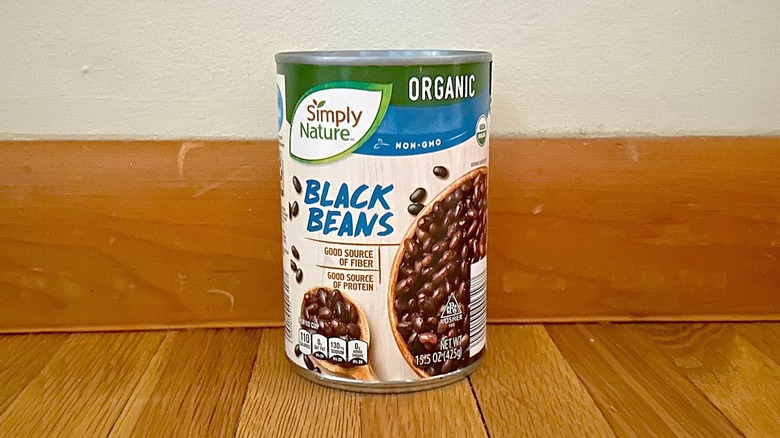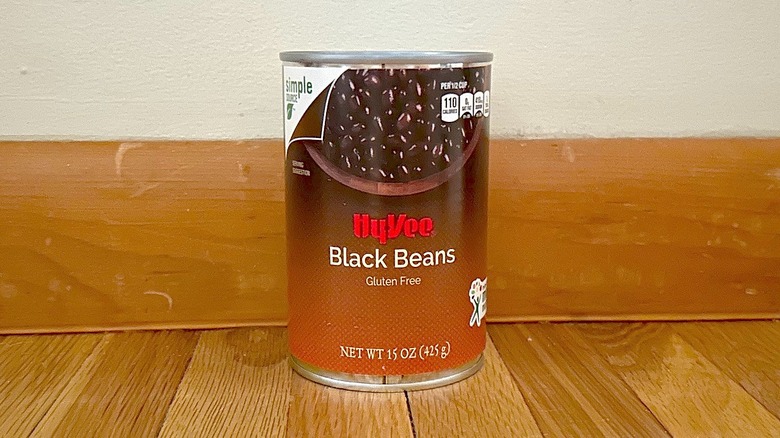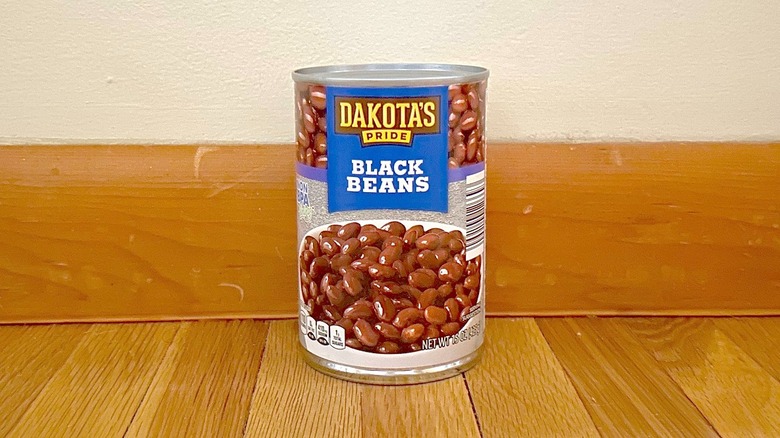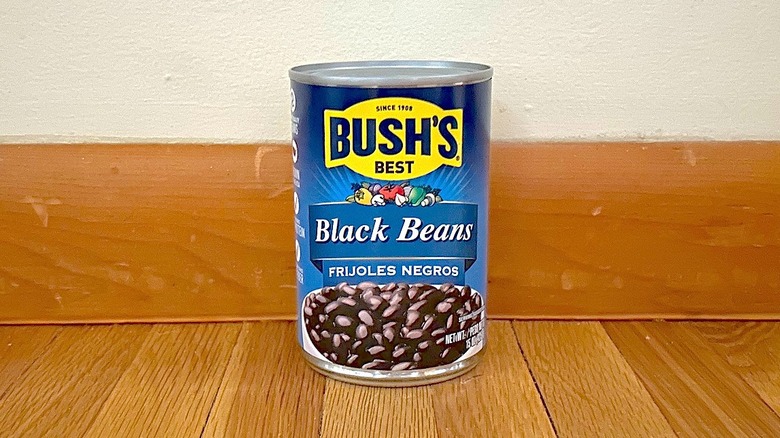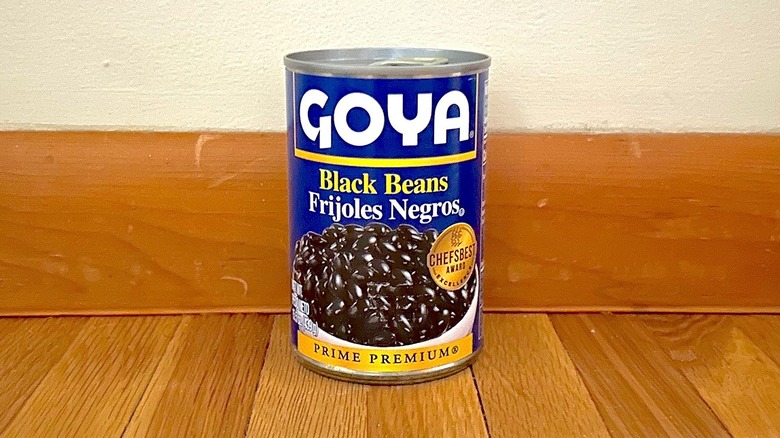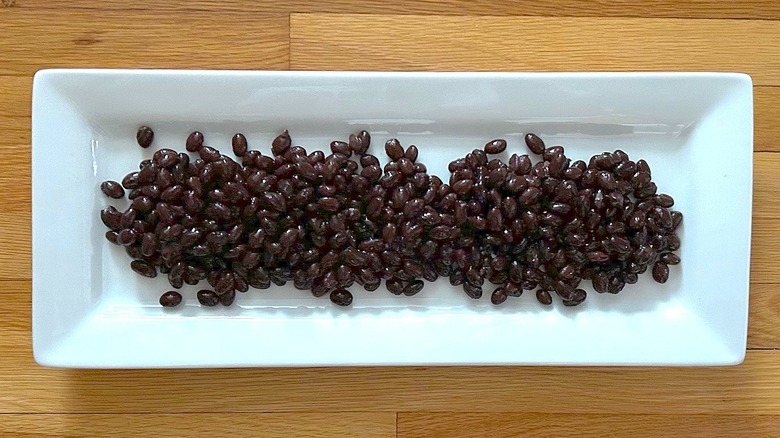12 Canned Black Beans, Ranked From Worst To Best
As we become increasingly aware of the many health benefits of consuming beans and lentils of various kinds, more attention is being paid to specific varieties of pulses that pack the most punch in the flavor and texture department. One of the most delicious and versatile of these legumes is the black bean. While black beans are also sold dry, the canned variety is infinitely easier and more convenient to use — and can be equally as tasty. The key is knowing which brands to purchase to maximize impact in popular recipes, like meaty vegetarian burgers and protein-rich salads.
In an effort to determine the highest quality canned black bean brand, I scoured grocery stores in my neighborhood, seeking out the most popular varieties, as well as a couple of more niche ones. I sampled these as-is, without any additional seasonings or preparation, to assess taste, mouthfeel, sodium content, and overall quality. Read on to find out what my discerning palate discovered, and how these black bean brands fared when I ranked them from worst to best.
12. Mrs. Grimes Black Beans
At the bottom of the list is a Midwestern brand with a long legacy dating back to 1902. Mrs. Grimes is an Iowa-born company that specializes in beans. The company's black beans had an average amount of sodium, at 410 milligrams per serving, which was all right. But this brand fell short in one key department: value. This was the emptiest of the cans, once the beans were drained and rinsed. The 15-ounce container was just over ¾ full after preparing the beans. And the color of the beans was oddly light in hue; the beans were almost tan, rather than dark brown.
Things did not improve markedly in the texture department, as these beans were completely disintegrated, and very few had a shape that remotely resembled an intact legume. They were extremely overcooked and mushy when you bit into them, dissolving on impact when they hit your tongue. The taste of these beans was also excessively salty, a factor that overwhelmed any other flavor elements. All in all, while I appreciated the history of this small business and its enduring spirit, I wouldn't recommend its beans.
11. Westbrae Natural Organic Black Beans
Next to last are the organic black beans from Westbrae Natural. This brand specializes in beans, producing certified organic, non-GMO legumes with an eye on sustainability. These beans have no salt added, which is a bonus for those monitoring their sodium intake. That said, there were some distinct issues with these beans, even though I really wanted to enjoy them and support the mission of the brand.
One strange aspect was the fullness of the can. While a majority of the 15-ounce containers I sampled had some space left in the can after draining off the liquid in which the beans are packed, this one appeared almost over-full, with the beans towering above the top of the vessel. On the positive side, the beans themselves were a deep brown, almost black hue, and whole, with no damage to the pulses.
The flavor of the beans was unremarkable, partly a result of the lack of salt added during the canning process. What was more problematic was the mouthfeel of these black beans. They were verging on underdone for my palate. I prefer my beans on the softer side, though not mushy, both for flavor and easier digestion.
10. Full Circle Market Organic Black Beans
Next up on my list of black bean brands were the organic ones from Full Circle Market. This is another brand that is certified organic and lower in sodium, with just 85 milligrams per serving — a bonus for those needing to limit salt intake. After draining the beans and rinsing them, I noticed something curious. All of the beans were split down the middle. This may be an indication that the beans were soaked for too long before they were cooked and canned. While this may not impact quality, it does make for a less attractive black bean for recipes in which you are not cooking or puréeing them, like this black bean and corn salad.
In terms of color, these beans were a medium-brown hue. Their texture was firm, but well cooked, not overtly al dente. The flavor again felt somewhat bland because of the lower sodium content, but, more importantly, the beans themselves had more of an earthy, grassy flavor, rather than a meaty, savory one. While some may find this flavor profile refreshing, I missed that umami-richness that I equate with black beans, as it's what makes them so useful as a meat substitute.
9. La Preferida Frijoles Negros
La Preferida's frijoles negros came in next on this ranking. The brand's low placement was surprising to me, as I have used this brand on numerous occasions. In a side-by-side taste test, however, I was underwhelmed by it. These beans have an average amount of sodium compared with other brands, at 410 milligrams per serving, which can be mitigated by thoroughly rinsing the beans before use.
The beans themselves had a lackluster, medium-brown color and were inconsistent in form, with some of them being intact, while others were completely pulverized in the can. Their texture was slightly squishy and quite starchy, leaving a notable film on my teeth like a tacky strip of tape. Their flavor was just okay. There was nothing notably good about them. While they'd be fine when added to a soup or stew recipe, along with other beans and aromatic ingredients, as a stand-alone, they were missing something.
8. Great Value Black Beans
The Great Value brand of black beans presented something of a conundrum. As store brands go, Walmart's products are readily available and relatively inexpensive. And, like the Westbrae Natural beans, the can was oddly overfilled, even after draining and rinsing them. In fact, I'd argue this can contained the most beans, which makes it a great value indeed. It also had a somewhat lower sodium content when compared with a majority of the others, at 370 milligrams per serving. That's where the good news ends and the issues begin.
The beans themselves appear to be a medium to dark brown hue, and have a firm texture that looks promising. When you bit into them, however, they were exceedingly mushy, to the point of virtually disintegrating on your tongue. While this may be desirable when making a recipe in which you plan to purée them, like this garlicky black bean dip, this is kind of a dealbreaker for something where you want the beans to maintain some integrity in shape and mouthfeel. In terms of flavor, these beans were fine. Again, nothing remarkable or overtly exciting, just a standard, mainstream black bean with a slightly starchy aftertaste.
7. Kuner's Southwest Traditional Black Beans
While this next selection of black beans has the moniker "Southwest" attached to the brand name, these are not a flavored bean. Kuner's Southwest is simply prepared with water and salt, containing an average of 410 milligrams of sodium per serving. These beans were surprisingly light in color, having an almost dark sandy tone. They were also very irregularly shaped, with some of the beans being split down the middle, others intact, and a majority of them falling apart in the can.
The texture of the beans did not improve markedly when you bit into them. They were mushy, starchy, and disintegrated without even chewing them. The taste of these beans was somewhat better, having a relatively well-balanced saltiness that accentuated the inherent flavor of the beans themselves. Though these beans weren't umami-bombs, they were tasty. I'd call them a good middle-of-the-road bean option, particularly for a creamy black bean soup, where it does not matter if the beans do not hold their shape well.
6. La Preferida Organic Black Beans
The organic black beans from the La Preferida brand fared somewhat better on this ranking. They were only 20 cents more than the regular iteration of this brand, which may be worth it, depending on what you are making. These beans had a similar sodium content to the regular variety, at 410 milligrams per serving. Their color was a medium-brown hue, and their shape was comparable to the previous La Preferida offering. Some beans were whole and intact, while others were completely falling apart.
When it comes to mouthfeel, these beans actually had a much nicer texture than the non-organic ones. They were slightly starchy, but still had a decent bite to them, even if they were on the softer side. In terms of flavor, they were markedly more robust, though obviously not as impactful as some of the brands that ranked higher on this list. That said, these are a serviceable bean that would work in most recipes, with the caveat that some of them may break apart if stirred too vigorously.
5. Simply Nature Organic Black Beans
Next on this ranking are the organic black beans from Simply Nature, a brand found at the fan-favorite, budget-friendly chain of Aldi. This certified organic and non-GMO brand also has a lower sodium content, at 130 milligrams per serving. This is relatively modest; higher than the Westbrae Natural and Full Circle Market varieties, but lower than a majority of the others I sampled. The beans themselves were a medium-brown hue and were mostly intact in the can, which seemed promising in terms of mouthfeel.
While these were by no means the softest of the beans, they were on the mushier side and a bit starchy. That said, they held their shape quite well, which may be to some people's liking. The lower salt content was notable, but not a dealbreaker. The flavor of the beans was decent, with some notes of umami-richness, though they were not as robust as the top brands in this ranking. If we are factoring in price and quality, this is a good brand that would suit the needs of many, even if I am a bit of a black bean snob.
4. Hy-Vee Gluten Free Black Beans
Where store brands are concerned, Hy-Vee often performs quite well. The brand, which services mostly audiences in the Midwest, is consistently cheaper and generally has a good reputation for quality. This product is no exception to this rule. The sodium level on these black beans is in line with most of the other mainstream brands, coming in at 410 milligrams per serving. The medium-brown-colored beans, though slightly irregular in shape, were mostly intact, with very few that were somewhat compromised in the can.
In terms of texture, these were delightful. They had a snappy exterior and a creamy center, something I love in a good black bean. While the flavor was perhaps slightly saltier than a few of the others, these also had subtle elements of that meatiness that I crave in beans. Overall, I gave these pulses relatively high marks and would definitely recommend using them in raw applications, in which their distinct mouthfeel can be appreciated.
3. Dakota's Pride Black Beans
As we move into the top three black bean brands, Aldi delivers another good option, with its Dakota's Pride offering. These beans were a relatively standard variety, with sodium levels of 410 milligrams per serving. The beans themselves were a medium-brown hue, and, while the shape of the beans were inconsistent — with some being broken apart — the majority were whole and unblemished.
As far as texture goes, these beans were slightly starchy, but they had a nice, firm mouthfeel, making them a good option for raw and cooked recipes. Where these beans shone was in the taste department. These were the first beans with a notably distinct flavor. The salinity was well-balanced, with a hint of an earthiness that gave them a rustic appeal. The aftertaste was uniquely savory and rich in umami notes. I'd definitely load up on these black beans the next time you are stocking your pantry up with staples from Aldi.
2. Bush's Best Black Beans
It should be no surprise that Bush's Best black beans landed near the top of this ranking. Bush's has been consistently delivering quality beans since the brand was established in 1908. Though they may be most well-known for their baked beans, these black beans deliver in flavor and overall quality. The only downside to this brand is that they had the highest sodium content, at 450 milligrams per serving. That said, this saltiness did not translate to the taste.
These beans had a dark brown, blackish color, and were very uniformly shaped. Their texture was firm and snappy, with a hint of residual starchiness that was not at all distracting. The flavor of these beans was mildly earthy and grassy, having a robust meatiness that I found appealing. Among the many great ways to use these canned beans would be adding them to a Southwestern-inspired breakfast frittata or using them in a spicy variation on classic hummus.
1. Goya Black Beans
Earning my vote for the best black bean brand on the market was Goya. Clearly, I am not the only chef who considers this to be a superior brand. It is the winner of the ChefsBest Excellence Award for overall quality, and has been granted the Good Housekeeping seal of approval. Accolades aside, these beans have a lot going for them. Their sodium levels are on par with many of the other brands, at 410 milligrams per serving. The one notable downside to these beans was the quantity in the can. This was the second most empty can after the beans were drained and rinsed, being just over ¾ full once prepared. That said, when it comes to color and shape, these beans were superior. They had a rich, black hue and were perfectly uniformly spherical, with no blemishes or imperfections.
The texture of these beans is firm on the exterior, but extremely luscious and creamy on the inside. The flavor of these beans is not overly salty, and they are exceedingly meaty, rich with umami notes and a complexity that seems almost out of character for a simple black bean. Clearly, these beans would perform well in any recipe, though if I was planning on making a veggie burger, I'd definitely opt for this brand first. It would produce a burger that would satiate even the most staunch carnivore.
Methodology
I purchased every black bean brand I could find from three major retail outlets within a one-hour radius of my home in central Illinois. In doing so, I did not visit specialty grocers or bulk retailers that require memberships, as I wanted to include options that would be readily available to the average consumer.
Before sampling the black beans, I drained and thoroughly rinsed them to properly ascertain texture and flavor, and determine any obvious differences in look or volume within the can. I did not heat the beans or season them in any way so as not to mask the inherent flavor of the beans.
Because of my background as a professional chef, I was looking at more obscure qualities, like how the beans would perform in various recipes, as this impacts my decision-making when it comes to what brands I prefer to purchase to outfit my pantry. I hope that my expert observations helped you to decide which brand suits your specific needs best.
